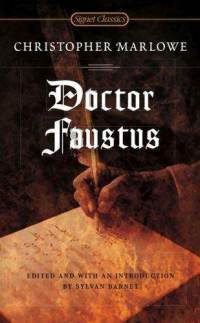Doctor Faustus By Christopher Marlowe Summary and Analysis Scene 5
 SCENE 5
SCENE 5 FAUSTUS discovered in his study.
FAUSTUS.
Now, Faustus, must
Thou needs be damn'd, and canst thou not be sav'd:
What boots it, then, to think of God or heaven?
Away with such vain fancies, and despair;
Despair in God, and trust in Belzebub:
Now go not backward; no, Faustus, be resolute:
Why waver'st thou? O, something soundeth in mine ears,
"Abjure this magic, turn to God again!"
Ay, and Faustus will turn to God again.
To God? he loves thee not;
The god thou serv'st is thine own appetite,
Wherein is fix'd the love of Belzebub:
To him I'll build an altar and a church,
And offer lukewarm blood of new-born babes.
Enter GOOD ANGEL and EVIL ANGEL.
GOOD ANGEL.
Sweet Faustus, leave that execrable art.
FAUSTUS.
Contrition, prayer, repentance — what of them?
GOOD ANGEL.
O, they are means to bring thee unto heaven!
EVIL ANGEL.
Rather illusions, fruits of lunacy,
That make men foolish that do trust them most.
GOOD ANGEL.
Sweet Faustus, think of heaven and heavenly things.
EVIL ANGEL.
No, Faustus; think of honour and of wealth.
[Exeunt ANGELS.]
FAUSTUS.
Of wealth!
Why, the signiory of Embden shall be mine.
When Mephistophilis shall stand by me,
What god can hurt thee, Faustus? thou art safe
Cast no more doubts. — Come, Mephistophilis,
And bring glad tidings from great Lucifer; —
Is't not midnight? — come, Mephistophilis,
Veni, veni, Mephistophile!
Enter MEPHISTOPHILIS.
Now tell me what says Lucifer, thy lord?
MEPHISTOPHILIS.
That I shall wait on Faustus whilst he lives,
So he will buy my service with his soul.
FAUSTUS.
Already Faustus hath hazarded that for thee.
MEPHISTOPHILIS.
But, Faustus, thou must bequeath it solemnly,
And write a deed of gift with thine own blood;
For that security craves great Lucifer.
If thou deny it, I will back to hell.
FAUSTUS.
Stay, Mephistophilis, and tell me, what good will my soul
do thy lord?
MEPHISTOPHILIS.
Enlarge his kingdom.
FAUSTUS.
Is that the reason why he tempts us thus?
MEPHISTOPHILIS.
Solamen miseris socios habuisse doloris.
FAUSTUS.
Why, have you any pain that torture others!
MEPHISTOPHILIS.
As great as have the human souls of men.
But, tell me, Faustus, shall I have thy soul?
And I will be thy slave, and wait on thee,
And give thee more than thou hast wit to ask.
FAUSTUS.
Ay, Mephistophilis, I give it thee.
MEPHISTOPHILIS.
Then, Faustus, stab thine arm courageously,
And bind thy soul, that at some certain day
Great Lucifer may claim it as his own;
And then be thou as great as Lucifer.
FAUSTUS.
[Stabbing his arm] Lo, Mephistophilis, for love of thee,
I cut mine arm, and with my proper blood
Assure my soul to be great Lucifer's,
Chief lord and regent of perpetual night!
View here the blood that trickles from mine arm,
And let it be propitious for my wish.
MEPHISTOPHILIS.
But, Faustus, thou must
Write it in manner of a deed of gift.
FAUSTUS.
Ay, so I will [Writes]. But, Mephistophilis,
My blood congeals, and I can write no more.
MEPHISTOPHILIS.
I'll fetch thee fire to dissolve it straight.
[Exit.]
FAUSTUS.
What might the staying of my blood portend?
Is it unwilling I should write this bill?
Why streams it not, that I may write afresh?
FAUSTUS GIVES TO THEE HIS SOUL: ah, there it stay'd!
Why shouldst thou not? is not thy soul shine own?
Then write again, FAUSTUS GIVES TO THEE HIS SOUL.
Re-enter MEPHISTOPHILIS with a chafer of coals.
MEPHISTOPHILIS.
Here's fire; come, Faustus, set it on.
FAUSTUS.
So, now the blood begins to clear again;
Now will I make an end immediately.
[Writes.]
MEPHISTOPHILIS.
O, what will not I do to obtain his soul?
[Aside.]
FAUSTUS.
Consummatum est; this bill is ended,
And Faustus hath bequeath'd his soul to Lucifer.
But what is this inscription on mine arm?
Homo, fuge: whither should I fly?
If unto God, he'll throw me down to hell.
My senses are deceiv'd; here's nothing writ: —
I see it plain; here in this place is writ,
Homo, fuge: yet shall not Faustus fly.











